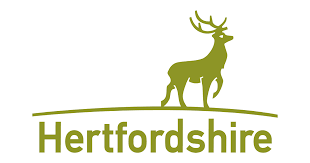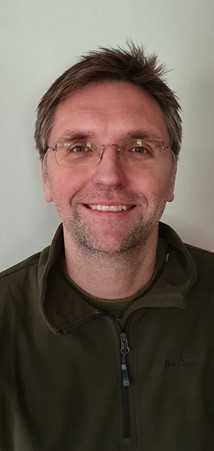
Join other savvy professionals just like you at CIHT. We are committed to fulfilling your professional development needs throughout your career
Welcome to the 8 Questions, where we ask senior figures in the sector the questions every business leader and ambitious professional wants answered. In this edition, Rupert Thacker, Head of Highways Strategy and Implementation at Hertfordshire County Council, is asked about community engagement, what skills are needed, what leaders need to be thinking about now and much more.

Effective communication with the community and stakeholders is essential. Make sure people have the opportunity to be part of the project.
You need to reach all parts of a community and the hardest bit is reaching those that aren’t really that interested or engaged in what you are doing. Using the right style and communication techniques at the right point in a project to try and spark that interest and engagement form individuals, businesses, and stakeholder groups is incredibly difficult. It often means using multiple different platforms form traditional letter drops, posters and meetings to more modern social media platforms and online content to bring people to the table. However, without it are you really getting a true representation of views and expectations and needs? It is very easy to be overwhelmed by those who shout loudest. Conversation and dialogue to help draw out the various aspects is also hugely beneficial and something that is often very difficult with how we have engaged traditionally with questionnaires and surveys that are then analysed and presented in black and white. However it is often this clarity that is needed at the key points in a projects development to reach agreement on the next steps so it shouldn’t ever be over looked.
We have been heavily involved in reconfiguring a number of busy High Street and town centre locations in response to the challenges of Covid 19 and the subsequent recovery of the High Street.
These were put in following the Governments guidance and close work with our Public Health colleagues at Hertfordshire. They were implemented and with very little advance engagement in order to have then in place for when shops and services began to re-open form the first lock down and to help people safely access services. It was a very worrying time and we wanted to ensure that the most vulnerable were supported as much as possible.
The measures split opinion like never before.
We set upon online feedback tool and the small team we had specifically set up to take them forwards was almost instantly overwhelmed requiring the team to expand in order to help review and most importantly respond with changes on the ground where they could be accommodated.
As things settled down the debate continued and we developed better ways to capture people’s thoughts, interact with stakeholders and begin to review the projects more broadly and against the backdrop of the governments announcements in respect to Active Travel LTN 1/20, and the climate emergency and put them in to context with the communities who’s thinking had also moved on with the changers gaining a level of support in a number of locations.
The takeaway is that we made changes that would usually have taken years to even get to a point of even being considered, almost overnight. Whilst this was in exceptional circumstances and hopefully something, we will not need to do again actually trying something, riding out the storm and then reviewing it after people had had the opportunity to live with it has provided a very different way to do things and engage people much more than they would if this was something that might happen. So should we do more temporary trials on the ground, I think so, with more engagement up front to raise awareness and get people talking.
For engagement to be worthwhile and valuable it really does need to be representative in all aspects. It has to cut across the communities, stakeholders from all areas and the response rate high enough to be considered robust and representative.
Being clear on the objectives and ambitions of a project from the outset is vital so that people can understand the context that ideas are being developed In and challenge that early if they disagree.
There is real value in engaging with individuals and groups to talk though these aspects to make sure that the project is aligned to the local environment.
Being able to demonstrate that this insight has helped to shape and evolve the outcomes is a crucial aspect. Whilst it is unlikely everyone will e entirely happy with what is proposed or even delivered it is important to show how you have got there and why, and that insight is invaluable to be able to demonstrate that.
Through the development of our Story Maps platform, we have enabled people to access map based tools drop pins and comments sitting along side more traditional surveys tools and questionnaires that has added to the level of insight we are getting through engagement.
It is always best if you can set out what success looks like before you have begun the project in earnest so that you have the ability to measure the project against it and agree they are the main drivers with the stakeholders. Be that what appear to be simple things like increasing the number of people walking and cycling or more complex aspects like better health outcomes for the wider community. This isn’t just about quantitative aspects such as speed and volume but more subjective elements and peoples perceptions and behaviours. This is often much harder to understand and may take longer to review and draw conclusion’s form.
As an industry its something that has historically not really been focused on. This is obviously changing and the work that Lucy Sunders and others have been doing and has helped move our thinking on hugely in terms of how we interact and review projects using new tools and engagement activities to help measure the outcomes and learn for the next challenge.
Communication is obviously the headline but it is much more complex than that when you break it down. How messages are developed and delivered and the way in which information is gathered reviewed and set out is all part of it and that requires empathy, technical knowledge and understanding of the subject.
People will only engage with us if they feel that it is going to be listened to. How often have you heard someone who says “this is a waste of time its going to happen anyway”. So they way that projects and engagement is communicated from the outset of a project is hugely important and that engagement happens early so people feel part of the process and develop an understanding of it so that even if it’s not necessarily what they want they understand how it came to be like that.
Engagement is often a time-consuming process and planning plan this out along side the other scheme focused activities is important so that it gets the time and consideration it needs so ensuring that the team are up to speed on this and what it looks like is an important part of a project managers considerations.
I personally think there are two areas both driven by our experiences from Covid 19. The first is online platforms for engagement. Virtual Town Halls and new ways to engage and record views has changes what we do and how we doit. The ability to enable interaction amongst residents and stakeholders one to one and to have a dialogue play out in front of you rather than being he one trying gather the information and interpret it and present it will all of the put falls is amazing and as the tools evolve, I think will provide a very different way of looking at things.
The other is trials as I mentioned earlier is the use of temporary changes in our High Streets and neighbourhoods that are allowed time to bed in and be monitored, accompanied by meaningful engagement is a great way to test, evolve and ultimately decide upon the suitability of them before costly and permanent changes are made. Obviously, they need to be carefully considered and done in a way that means that they do justice to the objectives, but they really do give everyone the chance to experience something rather than just try to imagine what it might be like with all the preconceptions that go with that.
Whilst it was undeniably in our conscious 5 or 10 years ago it didn’t have the urgency or the provenance it does today. Climate change and the need for us to take serious step in the transport industry to make meaningful change has surely got to be the biggest challenge we need to set ourselves. It is also the greatest opportunity to enable us to think differently and be bold in our aspirations to support existing and future generations.
Rupert has worked in the industry for 20 years and heads up the team responsible for the development of the counties transport strategies in line with Local transport Plan and oversees their delivery on the ground. This includes projects ranging from new large scale infrastructure to the implementation of smaller scale place based improvements in existing and new communities that seek to improve conditions for people walking and cycling and support the High Street.

The opinions expressed in this article are those of the authors. They do not purport to reflect the opinions or views of the CIHT or its members. Neither the CIHT nor any person acting on their behalf may be held responsible for the use which may be made of the information contained therein.